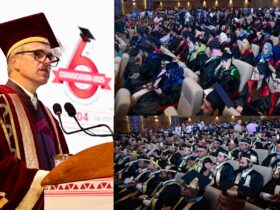Younis Kaloo
Srinagar, Aug 13 (KNB): Our elders say when they were young, they saw people living in close integration with each other irrespective of their religion, sharing food, speaking the same language, listening to same music, playing the same instruments, and participating in one another’s joy and sorrow. Above all, they had love for what they did and wanted to pass it on to the next generation. But now, that is all history!
Language is the first victim of cultural degradation. Given the rapidly growing exposure to the new world, the learning of new languages is coming at a cost: forgetting the mother tongue, which is now struggling to find acceptability in our daily life. People feel ashamed and inferior if they talk in Kashmiri. The worst case scenario is, most of us can’t write in Kashmiri.
It is estimated that in around 80 percent of the households in Kashmir, the Kashmiri language has been replaced by others, with the result when the children grow they know very little or nothing about the language.
Homes apart, even in offices and educational institutes, the foreign languages seem to have taken over, forgetting that our identity is directly related to the language we speak.
But sometimes, you come across some inspiring examples. I remember it was June 26, 2015. I and my female friend were at Kheer Bhawani in Tulmulla Ganderbal covering the annual festival. We were part of the social service camp organised by our university (CUK), serving refreshment to hundreds of devotees. Armed with two Digital SLR cameras and having been already issued cards with our names and the university we were from printed on them, we thought it the opportune time to meet, talk and listen to the people who once lived among us and shared their joy and sorrow with us.
In all our conversations we had, the one thing common we heard was, “We lived happily and peacefully together with our Kashmir brethren and we did not want to leave”. I had ambivalent feelings afterwards. On one hand, I felt sad for them having left their homeland and with no hope in sight to return. On the other, I was pleased to hear them speak in Kashmiri.
Language apart, the overall culture of Kashmir is said to be facing serious challenges, mostly form what is termed as ‘Net Culture’. Internet, also called information superhighway, offers a limitless access to diverse cultures of the world, which though is not harmful, but somewhere it is responsible for our younger generation abandoning their own. Also, ‘cultural unconsciousness’ in Kashmir is said to be playing its role in making people go away from their culture.
Educational institutes are also said to be not doing enough, which otherwise can be the best places to impart and practice culture. As much as important it is to learn the culture, it is equally important to teach. It has to be passed on from elders to the new generation, and we to prepare our new generation for that. (KNB)



















Leave a Reply